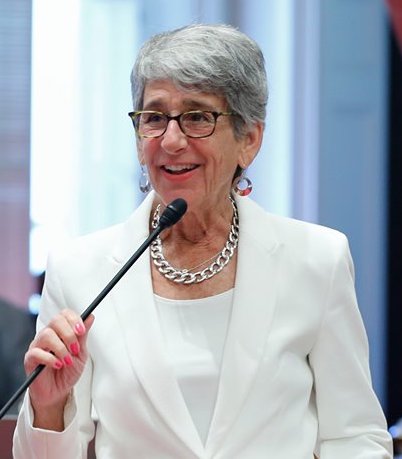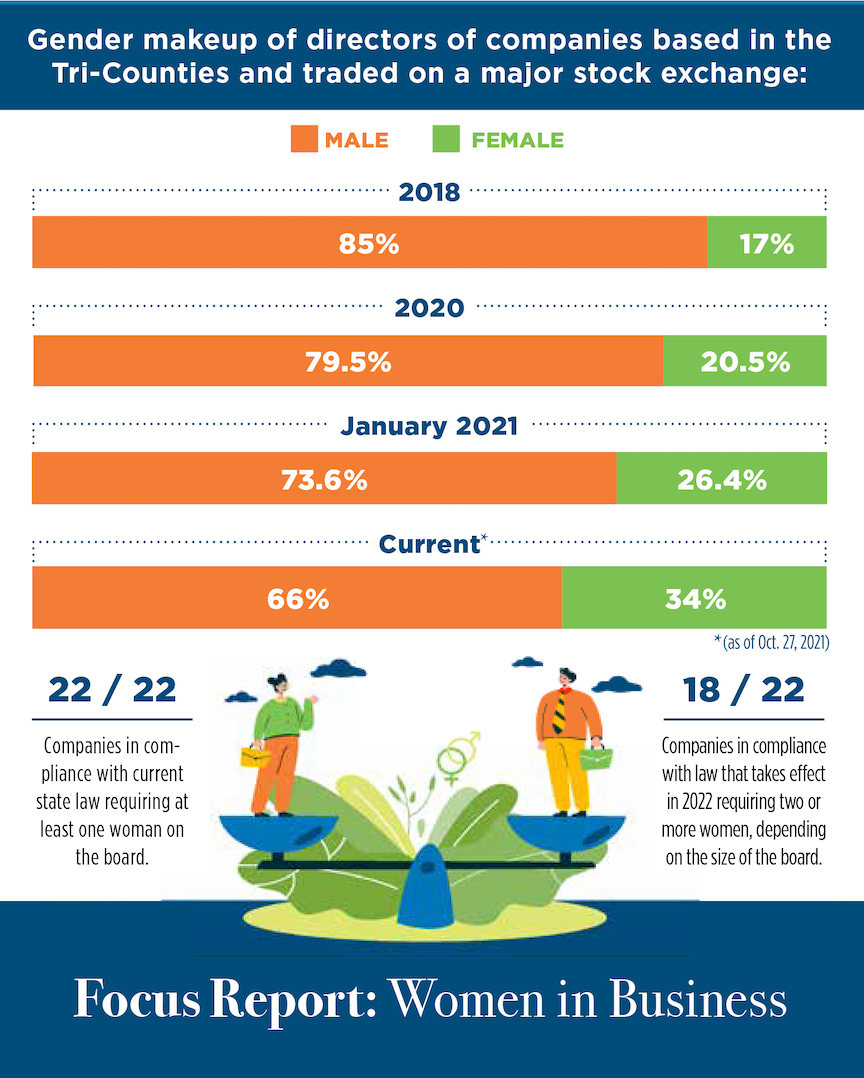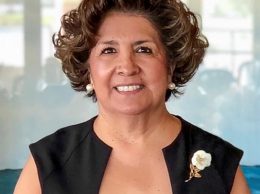Women’s share of region’s corporate board seats has doubled since 2018
IN THIS ARTICLE
- Banking & Finance Topic
- Jorge Mercado and pacbiztimes Author
By Jorge Mercado and pacbiztimes Friday, October 29th, 2021

Publicly traded companies in the tri-county region have added 18 women board directors this year, though a few companies still need to appoint more women to comply with stepped-up state diversity requirements that go into effect in 2022.
A total of 69 women sit on the boards of the 22 companies headquartered in the Tri-Counties and traded on major U.S. stock exchanges, according to Business Times research, up from 51 at the start of 2021.
There are 203 board members at those companies, which means 34% of board seats are occupied by women. That’s up from 26.4% of board seats occupied by women at the beginning of 2021, and 17% in 2018.
All publicly traded companies in the tri-county region also have at least one woman on their boards, meaning they comply with a state law that went into effect at the start of 2021. Three of them, though, do not yet meet the law’s standards for 2022 and beyond.
Senate Bill 826, which was signed into law in 2018, calls for publicly held companies trading on major stock exchanges with their executive offices in California to meet gender diversity requirements on their boards of directors. All companies are currently required to have at least one woman on their boards; by the start of 2022, many will have to have two or more, depending on the size of the board. The law sets fines of up to $100,000 for companies that do not comply, but the state has not levied any penalties yet, in part because of ongoing litigation surrounding SB 826.
The bill was written by former State Sen. Hannah Beth-Jackson, a Santa Barbara Democrat who retired from the Legislature in 2020.

“The companies that have the diversity reflective of the society in which we all live, they perform better,” Jackson told the Business Times. “There’s sort of stagnation there. Sort of a good ol’ boys’ club network, and no real desire to shake things up at all.”
Noting that women account for 70% of all consumer spending, Jackson called gender diversity at the board level “a no-brainer.”
“Why in the world wouldn’t you want to have women on your board to help make the decisions and all of the things necessary to attract your customers?” she said.
The step-up that takes effect in 2022 demands that boards with six or more directors have at least three women. If there are five directors, then at least two must be women. If there are four or fewer directors, then at least one woman must be on the board.
As of Oct. 27, 18 of the 22 publicly traded companies in the tri-county region complied with the bill’s standards for 2022.
The companies that need changes to their boards by the start of 2022 to comply are The Trade Desk, Calavo Growers, Mission Produce and Community West Bancshares.
Three companies in the tri-county region have gone public in 2021, and all three comply with the stepped-up gender diversity requirements: Dole, Olaplex and Procore Technologies.
Olaplex has by far the most women on its board of any company in the region. The Montecito-based hair products company has nine women on its board, out of 11 directors. No other company’s board has more than four women.
The agency that will enforce SB 826 is the Secretary of State’s Office. The office asks companies to fill out disclosure statements regarding women on their boards, though it cannot force them to do so.
According to the 2021 compliance report, published in March, 311 publicly traded companies in California had at least one woman on their board of directors by Dec. 31, 2020.
In 2018, 766 board seats in California were held by women, and in 2020 the figure had risen by 66.5%, to 1,275, according to a report by the California Partners Project.
Almost 30% of publicly traded companies in 2018 had all-male boards; by 2020, just 2.3% did.
But, more than 665 women still need to join corporate boards in California by the end of 2021 to meet the law’s new requirements, the California Partners Project said.
The state has not fined any businesses for noncompliance, but it could do so in the future, according to Jenna Dresner, a senior public information officer at the Secretary of State’s Office.
“The Secretary of State retains the discretion to implement fines depending on the facts and circumstances at the time any such decision is made,” Dresner said in an email to the Business Times.
Santa Paula-based Limoneira Co. came into compliance with the 2022 standards on Oct. 27, when it appointed Elizabeth Mora, a veteran financial executive, to its board. That gave Limoneira three women on its 11-person board of directors.
Mission Produce, an Oxnard-based avocado distributor and grower, does not yet comply with the 2022 requirements. In a statement to the Business Times, founder and CEO Steve Barnard said Mission Produce is “aware” of the California requirements on board diversity.
“Our board of directors continuously monitors the mix of specific experience, qualifications and skills of its members to ensure that the board has the necessary tools and diversity to function and give oversight effectively, in consideration of both current and future business needs,” Barnard said. “The board views diversity as a priority and is considered in all governance and director candidate selections, with the goal to represent a comprehensive range of attributes.”
At Community West Bancshares, the parent company of Goleta-based Community West Bank, one of three women on the 12-member board of directors resigned in May, and the company is in the process of vetting replacement candidates. Community West is “actively pursuing” its next woman board member, CEO Marty Plourd said.
“From a discipline standpoint, we take the complexion of the board seriously, meaning we need to have the right ingredients for the best soup possible to create balance, and a well-rounded individual to assist in progressively moving the bank forward,” Plourd said.
Calavo Growers, a Santa Paula-based publicly traded avocado distributor, has two women on its 11-person board. Nelia Alamo, Calavo’s vice president of communications, said the company is “currently compliant and it’s our intention to be fully compliant by the end of the year.”
There are several benefits of having women on companies’ corporate boards, said Nancy O’Reilly, president of Women Connect4Good, a nonprofit that supports and advocates for women in business.
The bottom line, she said, is that companies are more successful when women serve on their boards.
“They are more profitable,” O’Reilly said. “Studies show time and time again that when women are on board of directors and serve top leadership positions, there’s great success.”
SB 826 is “exactly what needs to happen, and it’s late in coming, but it has got to start somewhere,” she said. “We can’t become what we don’t see and what we don’t understand, and what we can’t learn from.”

Related Articles
Opinion: The rewards and challenges of a truly multicultural workforce
 Friday, April 8th, 2022
Friday, April 8th, 2022









